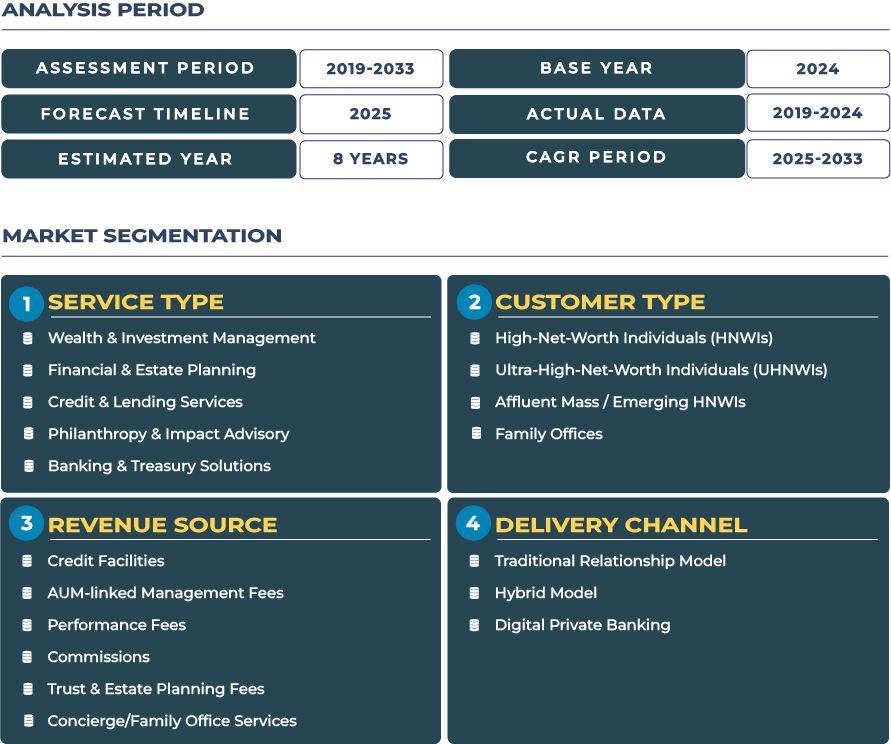Indonesia Private Banking Market Outlook: Emerging Wealth and Family-Office Formation
Indonesia is experiencing a pronounced shift in its wealth-management paradigm as entrepreneurial fortunes and family-office formations gain traction. The private banking market in Indonesia is projected to reach approximately USD 14.1 billion in 2025 and is forecast to expand to around USD 21.8 billion by 2033-indicating a CAGR of 5.6% during the forecast period. This growth is being driven by the acceleration of high-net-worth individuals (HNWIs), digital onboarding of affluent clients, commodity-linked wealth creation and an increasing emphasis on legacy and family-office advisory.
Note:* The market size refers to the total revenue generated by banks through various services.
Within this evolving private banking ecosystem, service providers are shifting from product-centric wealth investment to holistic client-lifecycle offerings that include investment advisory, estate & legacy planning, tailored credit and lending solutions, philanthropy and impact advisory, and banking & treasury services. These offerings are increasingly tailored for Indonesia emerging family-office segment, founder-led enterprises and affluent next-gen clients. The country’s macro context-rising middle-class affluence, digital commerce growth, and regulatory reforms aimed at deepening capital markets-creates a fertile environment for the transformation of the private banking sector.
Key Growth Drivers & Structural Headwinds in Indonesia Private Banking Market
Rising HNWI Base, Commodity-Linked Wealth And Digital Inclusion
Indonesia wealth accumulation is underpinned by a growing segment of entrepreneurs, family-business successors and affluent professionals. Reports indicate significant growth in the HNWI and ultra-HNW segments in 2025, driving demand for private banking services. Moreover, Indonesia resource-rich economy-particularly minerals, agriculture and infrastructure-continues to generate wealth that requires structuring, diversification and legacy planning. The digital revolution also plays a pivotal role as tech-savvy clients seek mobile-first platforms, real-time portfolio insights and seamless digital advisory, acting as a catalyst for the private banking ecosystem.
Currency Volatility, Financial-Literacy Gap and Regulatory Constraints
Despite these enablers, the market faces several obstacles. The Indonesian rupiah remains susceptible to global commodity and currency swings, which can suppress confidence in offshore wealth diversification and cross-border asset flows. Weak financial literacy among emerging affluent segments means lower advisory uptake and higher cost-to-serve for personalised private banking. Regulatory frameworks, while improving, still present compliance and structuring challenges for cross-border advisory, trust services and wealth-mobile segments. These constraints suppress the pace at which private banking can scale and diversify services.
Emerging Trends and Opportunity Horizons in Indonesia Private Banking Ecosystem
Fintech-driven Wealth Apps, Shariah-Private Banking, Digital HNWI Onboarding
Indonesia private banking sector is witnessing the emergence of wealth-tech platforms designed specifically for affluent clients-mobile apps, robo-advisory modules and integrated dashboards are becoming standard. Fintech partnership models are being adopted to access next-gen wealthy individuals. Additionally, the growth of Shariah-compliant private banking solutions provides a culturally-aligned route for affluent Indonesian Muslims, given the country’s large Muslim population and growing Islamic-finance ecosystem. Onboarding of younger HNWIs via digital channels is accelerating service reach and efficiency.
Digital Wealth Expansion, Islamic Private-Banking Proliferation, Family-Office Growth
For private banks in Indonesia, several strategic opportunities stand out. Scaling digital wealth advisory platforms offers access to the underserved affluent segment beyond Jakarta and major islands-allowing for targeting regional wealth pockets. Also, expanding Shariah-compliant private banking services and products-aligned with ethical and religious preferences-represents a differentiator. Furthermore, the burgeoning family-office segment among founding families offers demand for integrated advisory across investment, estate, philanthropy, governance and succession. Firms that architect service models tailored for these opportunities will differentiate themselves in Indonesia evolving private banking market.
Competitive Landscape: Strategic Platform Moves in Indonesia Private Banking Sector
The competitive landscape in Indonesia private banking market blends local incumbents and global players executing platform-driven strategies. A prominent institution, Maybank Indonesia, been acknowledged for its private-wealth growth-closing 2024 with more than 20,000 HNW clients and delivering strong retention and product-depth metrics. Global banks and international private-wealth managers are entering or deepening their footprint in Indonesia via digital wealth partnerships, family-office desks and structured product offerings. Competitive differentiation centres on delivering integrated client experiences-wealth management, estate planning, legacy advisory, bespoke lending and cross-border treasury solutions. In a market that remains evolving, the players that invest in digital platforms, local talent development and cultural alignment will secure the leading private banking position.







